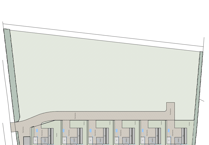EACH week, hundreds of planning applications come before Cornwall Council’s planning department, seeking to win approval for various plans right across the Duchy, with some concerning Holsworthy handled by Torridge District Council.
These plans can comprise of a number of different reasonings – ranging from permission to replace windows or listed building consent ranging up to large house building developments or changing of use of a building, for instance, from an office to a café, or flats.
Within this large and often complex system, there are a number of formats from which planning advice and approval can be sought.
These range from full applications where all the details which comprise a proposed development or work to a building are submitted, to outline applications, where further details are yet to be confirmed, for example, an outline application with reserved matters for appearance may not confirm the final proposed development but rather seek permission in principle.
An example of this is one for an outline permission for 20 dwellings on land with reserved matters for appearance and scale; the reserved matters would require further permission later for their inclusion.
Other types of applications include pre-application advice requests, where would-be developers submit often outline proposals to a local authority to ascertain whether it is likely to gain support or not prior to submitting a planning application.
The vast majority of applications are decided by planning officers employed by a local authority under ‘delegated powers’, meaning they do so on behalf of their employer, however, some applications are ‘called in’ by local councillors to be discussed at an area’s strategic planning committee meeting, meaning the final decision rests with a committee of councillors.
Permission in principle for dwelling refused
AN application seeking the permission in principle for the construction of a property near Bude has been refused by Cornwall Council.
Mr Walker applied to the local planning authority seeking the permission in principle approval for the construction of a dwelling at Hillcrest, Stibb Road, Bude.
A permission in principle consent route is an alternative way of obtaining planning permission for housing-led development which separates the consideration of matters of principle for proposed development from the technical detail of the development. The permission in principle consent route has two stages: the first stage (or permission in principle stage) establishes whether a site is suitable in-principle and the second (‘technical details consent’) stage is when the detailed development proposals are assessed.
It had previously been the subject of a pre-application advice enquiry which gave a negative response, stating that it was the view of the council that construction of the dwelling would be unsustainable.
It said: “Overall, future occupiers of the proposed dwelling would be heavily reliant on the private car in order to access even the basic services, such as a shop, as well as a choice of leisure facilities and pubs or restaurants, and in order to reach any comprehensive public transport connections.
“I accept that the proposal would not result in the level of trips that would likely impact on road safety and that dependence on private cars often provides the main means of transport within rural areas, but the proposal would exacerbate the level of reliance on the private car and would not sufficiently support walking, cycling or the use of public transport. It is therefore adjudged that the site is not accessible by a range of transport modes.”
Refusing the application, Cornwall Council told the applicant: “The proposed development would represent the provision of unsustainable housing development in the open countryside, outside of any defined established settlement. Residential accommodation on this site would not achieve convenient accessibility to necessary essential services, employment opportunities and facilities, which would perpetuate an over reliance on the private vehicle and unsustainable traffic movements.
“The proposal would fail to promote an integrated approach to the delivery of new development or support a sustainable pattern of growth. In the absence of any special circumstances to justify residential development in this rural location, the proposal is not sustainable development. The adverse impacts of the proposal would significantly and demonstrably outweigh any potential benefits.
Padel Ball court refused
A CHANGE of use application for land to a residential garden and the construction of a padel court with associated works has been refused by Cornwall Council.
The application concerned a property known as Trevaney, Constantine Bay, Padstow.
The application seeks full planning consent for the change of use of land to residential garden and construction of a padel court with associated works.
The land is located directly to the east of the residential dwelling known as Trevaney, Constantine Bay, Padstow and it is proposed that the land and padel court would be associated with this dwelling.
The site is largely rectangular in shape surrounded by mature boundary hedging to the north and west and by post and rail fencing to the south and east. The site is located within the National Landscape (previously known as Area of Outstanding Natural Beauty) and is wholly within a County Wildlife Site.
St Merryn Parish Council initially supported the proposal, however, later objected to the proposal on the grounds of potential noise impacts and visual harm.
It was noted that inadequate information was provided during the application, with the planning officer adding: The benefits of the proposal are predominantly private benefits to the applicant and not public benefits. It is acknowledged that there would be some modest economic benefits during the construction process, however, these would be short lived.”
Refusing the application, Cornwall Council told the applicant: “The proposal would, through the encroachment of development into this area of natural undeveloped land, lead to the erosion of its verdant nature and the permanent loss of a section of the Porthcothan Valley Cornwall Wildlife Site and negatively impacts on the coherence of the wider CWS network by preventing future regeneration of the biodiversity and natural habitat on this site and forming a barrier to further connectivity between the Local Natural Recovery Network.
“Additionally, the introduction of additional built form and associated domestic paraphernalia on this site is considered to degrade its uniquely unspoiled character which depends on the readily legible relationship with the wider County Wildlife Site which currently acts as an important green buffer between the coast and the more densely populated development within the settlement.
“As a result, the proposal is considered to harm the landscape character and natural beauty of the Cornwall National Landscape, this section of which is characterised by its modest settlements that reflect its peaceful and wild nature.”
A second recommendation for refusal added: “In the absence of a suitable noise assessment to assess the impact of the proposed padel court on the residential properties to the north east of the application site, the proposal is not considered acceptable. Taking a precautionary approach, and without the appropriate assessment to prove otherwise, it would be deemed that the introduction of padel court in this location would cause significant noise harm to neighbouring properties which would be considered unacceptable.”
- Keep up to date with the latest planning applications and other statutory notices (such as alcohol licensing and probates) that affect where you live by visiting our online Public Notice Portal – be the first to know by visiting www.publicnoticeportal.uk/cornish-and-devon-post-series





Comments
This article has no comments yet. Be the first to leave a comment.